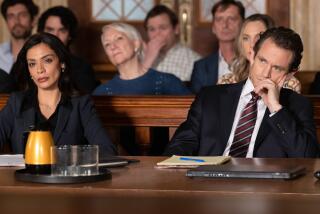TV Reviews : PBS Reports on 4th Amendment
- Share via
This being the first Monday in October, the U.S. Supreme Court reconvenes today to consider and rule on the laws of the land. With that in mind, PBS serves up an hourlong report about the relationship between the high court and law enforcement.
Narrated by Roger Mudd, “Search and Seizure: The Supreme Court and the Police” (tonight at 9 on KCET-TV Channel 28 and KPBS-TV Channel 15, 8 p.m. on KVCR-TV Channel 24) takes a thoughtful and balanced look at the history of the Fourth Amendment and explores how changing interpretations of it have affected police work through the years.
The Fourth Amendment was a response to particular abuses suffered by the Colonists in 18th-Century America. “General warrants” were issued to the king’s agents that allowed them unlimited rights of search and seizure (including dragooning able-bodied seamen). “Writs of assistance” were perpetual search warrants, good as long as the king who issued them remained on the throne.
The framers of the Bill of Rights designed the Fourth Amendment to abolish these abuses, holding that citizens should be protected from unreasonable searches and seizures, except upon probable cause.
As Mudd relates, the measure attracted little controversy until 1914, when the Supreme Court forged the exclusionary rule, which held that evidence in federal cases obtained in violation of the Fourth could not be introduced. In 1961, the Warren Court extended that rule to cover state and local governments, much to the displeasure of police and prosecutors.
“Search” shows how that ruling affects police work today. Included are two clips from “Dragnet,” which show how Sgt. Joe Friday went about his work, before and after the ’61 ruling. And we travel with Oakland homicide detectives who must go before a judge to obtain a search warrant before entering the home of a murder suspect. We also sit in on a police training session as the instructor details how the Fourth will affect the trainees’ work.
The program makes clear that the Fourth Amendment rests on a delicate balance: how to protect our rights of privacy while protecting the public from criminals.
More to Read
The complete guide to home viewing
Get Screen Gab for everything about the TV shows and streaming movies everyone’s talking about.
You may occasionally receive promotional content from the Los Angeles Times.




